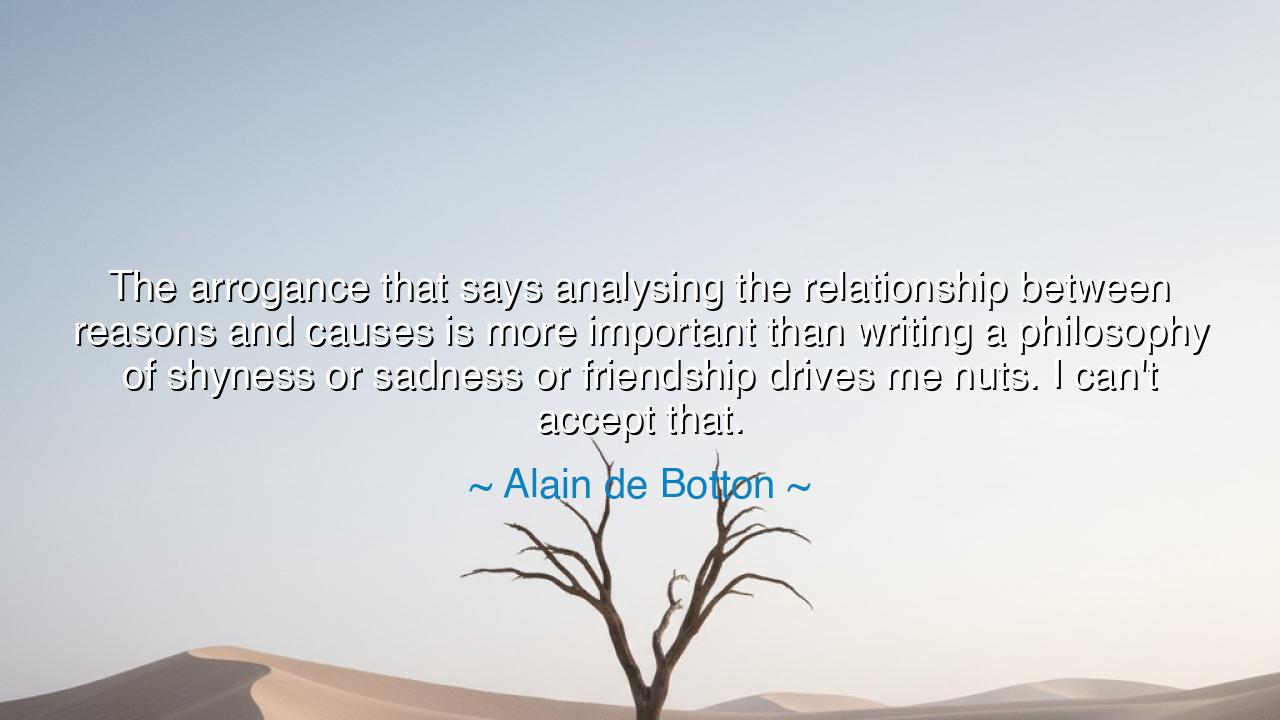
The arrogance that says analysing the relationship between
The arrogance that says analysing the relationship between reasons and causes is more important than writing a philosophy of shyness or sadness or friendship drives me nuts. I can't accept that.






In the passionate words of Alain de Botton, a philosopher of the modern age and a student of the human heart, we hear a cry against the coldness of intellect without compassion: “The arrogance that says analysing the relationship between reasons and causes is more important than writing a philosophy of shyness or sadness or friendship drives me nuts. I can’t accept that.” This statement is both a lament and a declaration — a rejection of sterile reasoning that forgets the beating pulse of life itself. De Botton reminds us that philosophy, at its truest, is not an ivory tower of logic but a living art that seeks to understand the human soul — our emotions, our vulnerabilities, and our need for connection.
In his words burns a righteous indignation at a world that has prized intellect over empathy. He challenges the arrogance of thinkers who believe that abstraction — the analysis of cause and effect, of reason and argument — is superior to the exploration of the very experiences that make us human: the trembling of shyness, the ache of sadness, the grace of friendship. What use is a philosophy that cannot speak to the heart? What wisdom is it that cannot comfort, guide, or heal? De Botton calls us back to the ancient purpose of thought — not to dazzle with cleverness, but to serve the needs of the soul, to understand what it means to live and to feel.
The origin of this insight lies in De Botton’s lifelong mission to return philosophy to its humane roots. A writer, not of abstract metaphysics but of emotional truth, he has always sought to make philosophy practical — to bring it down from the clouds into the homes and hearts of ordinary people. In works such as The Consolations of Philosophy, he follows in the footsteps of Socrates, Seneca, and Montaigne, who believed that wisdom must be lived, not merely thought. These sages taught that philosophy’s highest task was not to explain the machinery of the universe, but to teach men and women how to endure sorrow, how to conquer fear, and how to love wisely. Thus, De Botton’s frustration is not against reason itself, but against its arrogance — its pride in severing itself from the realm of feeling, from the poetry of life.
The ancients understood this harmony between thought and emotion. Aristotle, in his Nicomachean Ethics, spoke of the cultivation of virtue not through analysis, but through the shaping of character — the tempering of our desires, the training of our hearts. Marcus Aurelius, emperor and philosopher, wrote not of abstract logic but of courage, mortality, and forgiveness. The Stoics did not debate endlessly about the nature of causes; they asked, instead, how a man might find peace in the face of loss, or grace in the presence of pain. To them, philosophy was a medicine for the soul. De Botton’s words stand firmly within this ancient lineage — an echo of a wisdom that modernity too often forgets.
Consider, for a moment, the story of Blaise Pascal, the seventeenth-century mathematician who bridged the worlds of reason and faith. After mastering the cold logic of numbers, Pascal wrote of the heart as a realm of truth that reason could never reach. “The heart has its reasons,” he said, “which reason knows nothing of.” He saw what De Botton sees: that human life cannot be reduced to logic, for we are creatures of tenderness and contradiction. The man who has mastered analysis but not compassion is, in truth, a crippled thinker — able to measure the heavens but unable to understand a single tear.
There is a heroism in De Botton’s defiance. He stands against an age that glorifies intellect as the highest virtue, reminding us that wisdom must include humility — that understanding shyness or sadness is no less noble than analyzing the structure of thought. To write a philosophy of friendship, as he desires, is to honor the ordinary miracles of human existence. It is to say that how we speak, how we forgive, how we hold one another in grief, are matters as worthy of contemplation as the movements of stars or the origins of time.
Thus, let us take this teaching to heart. Let us not mistake intelligence for wisdom, nor logic for love. Let us cultivate a philosophy of compassion — one that speaks to our wounds as well as our wonders. When you see a friend lost in sadness, offer presence before explanation. When you reflect upon the mysteries of life, do not forget that the smallest gesture of kindness often holds more truth than the grandest theory. Think deeply, yes — but feel deeply too.
For in the end, as De Botton reminds us, the true work of philosophy is not to dissect the world, but to heal it. The mind alone cannot make us whole; only when joined with the heart can it give meaning to our days. So study the stars, but also study the silences between friends. Examine the causes of the universe, but also the quiet trembling of the human spirit. For in shyness, in sadness, in friendship, lies the very essence of what it means to be alive — and that, above all, is what philosophy was born to understand.






AAdministratorAdministrator
Welcome, honored guests. Please leave a comment, we will respond soon